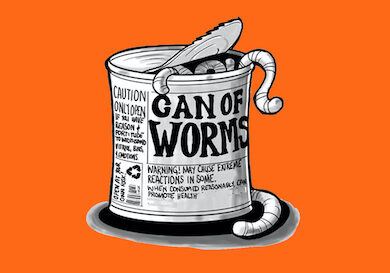Huh? What in the world is an oxymoronic paradoxical statement? This might be the first time anyone has ever asked this question in the history of the world. Not, “Huh?” The other one.
Paul made more than one oxymoronic paradoxical statement. However, one is found in 2 Corinthians 12:10, “For the sake of Christ, then, I am content with weaknesses, insults, hardships, persecutions, and calamities. For when I am weak, then I am strong.”
From a human perspective, this statement of Paul’s (along with what comes before and after) does not make sense. The idea is unreasonable. It is incomprehensible, inconceivable, implausible, and ludicrous. Not to mention mind-blowing. In other words, the message is oxymoronic and paradoxical.
A similar concept refers to someone (usually ourselves) as the low man on the totem pole. The statement is used to express a lack of importance. But the low man on the totem pole is the most vital of all above.
To understand Paul’s reasoning, we must step out of the realm of human reason and incorporate the mind of Christ.
Jesus said, “If you want to be great, learn to be the servant of all.”
To healthily accomplish these oxymoronic paradoxical statements, we must have a good understanding of the inferred third commandment. We put much emphasis on loving God, and rightly so.
To love God, we must love others, and to love others; we must love ourselves. To the extent we can love ourselves is the degree we can love others and ultimately love God. Only when we have a healthy understanding of who we are in Christ can we prefer others above ourselves.
It’s oxymoronic. It’s paradoxical. If you want to be strong in Christ, focus on being weak in self. John said it best, “He must increase, but I must decrease” (John 3:30).
I’m still on this journey. How about you?
You might also like these articles...
Christian Freedom
Christian Freedom Christian freedom is a key theme in our Christian faith, but it is often misunderstood. From a biblical perspective, true freedom isn’t about having no limits or doing whatever we want. Instead, it is the ability to live as God designed—free from the bondage of sin, shame, fear, and death. In John 8:36,…
A Can Of Worms!
I have heard this term many times. A husband or wife may say, “Let’s not go there. That will open up ‘a can of worms.’” A parent may say, “I don’t want to open up that ‘can of worms.’ What do they mean? Cambridge Dictionary defines ‘a can of worms’ as “a situation that causes…
Perfect Hatred!
Perfect Hatred Is perfect hatred possible? The Psalmist, David, spends most of the 139th Psalm declaring the beautiful works of God on a personal level. If it’s been a while since you have read Psalm 139, I encourage you to do so. Then, David gets to the 19th verse and does an about-face. David clearly…




